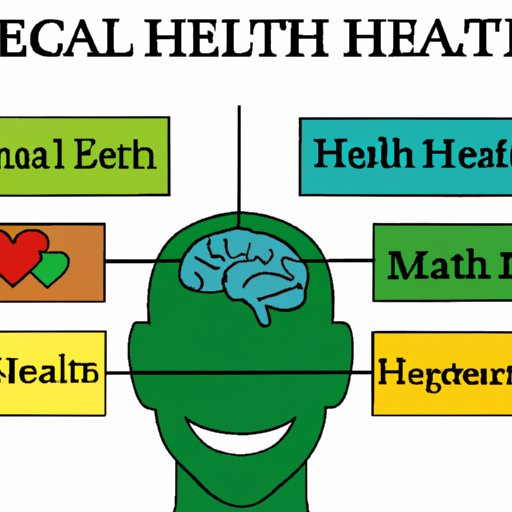Introduction
Mental and emotional health play a critical role in our lives and can impact our overall well-being. Mental and emotional health are both important aspects of life that need to be addressed in order to live a happy and healthy life. But what is mental and emotional health? And why is it so important? This article will explore these questions and provide practical tips on how to improve your mental and emotional health.
Definition of Mental and Emotional Health
Mental health is defined as “a person’s psychological and emotional wellbeing” (1). It encompasses our ability to think, feel, and behave in a positive way. Mental health also includes our capacity to cope with stress, manage difficult emotions, and build meaningful relationships. Emotional health refers to our ability to recognize, understand, and express our emotions in a healthy manner (2). It is the foundation for our physical, mental, and social wellbeing.
Why it Matters
Having good mental and emotional health is essential for living a fulfilling life. Research has found that mental and emotional health are linked to physical health, such as reducing the risks of developing chronic illnesses (3). Poor mental and emotional health can lead to feelings of depression, anxiety, and loneliness, which can have an effect on our ability to perform daily tasks and engage with others (4). Therefore, it is important to ensure that we prioritize our mental and emotional health in order to maintain our overall wellbeing.

How to Improve Your Mental and Emotional Health
There are many ways to improve your mental and emotional health. Here are some practical tips to get you started:
Exercise
Physical activity can help boost your mood and reduce stress levels. A study conducted by the University of California found that regular exercise can reduce symptoms of depression and anxiety (5). Exercise can also help you stay focused and energized throughout the day, making it easier to tackle tasks and feel productive.
Adolescence Challenges
Adolescence can be a difficult time for many people. During this period, it is important to focus on self-care and building healthy habits. This includes eating nutritious meals, getting enough sleep, and engaging in activities that make you feel good. Additionally, it is important to talk to trusted adults, such as parents and teachers, to get support when needed.
Mindfulness
Mindfulness is a practice that involves being aware of the present moment. It can help you better regulate your emotions and reduce stress levels. Studies have found that practicing mindfulness can improve concentration, reduce anxiety, and enhance self-esteem (6). You can practice mindfulness through breathing exercises, meditation, and yoga.
Nature
Spending time in nature can be beneficial for your mental and emotional health. Nature has been shown to reduce stress levels, increase happiness, and improve overall wellbeing (7). Even just taking a walk outside can help you relax and take a break from your daily worries.

Mental and Emotional Health Across the Lifespan
Mental and emotional health can look different at different stages of life. Here is a brief overview of how mental and emotional health can change across the lifespan:
Infancy and Early Childhood
During infancy and early childhood, it is important for children to develop secure attachments with their caregivers. This helps them learn to trust and form healthy relationships with others. Additionally, children should be provided with nurturing environments that foster their emotional and social development.
Adulthood
In adulthood, mental and emotional health can be affected by stressful life events, such as job loss or relationship issues. It is important to practice self-care and find ways to cope with stress. Additionally, adults should seek out social support when needed and find activities that bring joy and purpose to their lives.
Middle Age
During middle age, it is important to maintain strong relationships with family and friends. Additionally, it is important to find ways to stay physically active and engaged with the world around you. This can help prevent feelings of boredom and loneliness.
Elderly
As we age, it is important to maintain a sense of purpose and meaning in life. This can involve engaging in activities that bring joy and connecting with others. Additionally, it is important to take care of our physical health, as this can have a positive impact on our mental and emotional wellbeing.
Conclusion
In conclusion, mental and emotional health is essential for living a fulfilling life. It involves our ability to think, feel, and behave in a positive way, as well as our capacity to recognize, understand, and express our emotions. There are many ways to improve your mental and emotional health, such as exercising, practicing mindfulness, and spending time in nature. Additionally, mental and emotional health can look different at different stages of life. By understanding the basics of mental and emotional health and how it can change across the lifespan, you can take steps to improve your own mental and emotional wellbeing.
Final Thoughts
Mental and emotional health is an important aspect of life that needs to be addressed in order to live a happy and healthy life. While there is no one-size-fits-all approach to improving mental and emotional health, there are many strategies that can help. By taking small steps to improve your mental and emotional health, you can cultivate a life of joy and wellbeing.
(Note: Is this article not meeting your expectations? Do you have knowledge or insights to share? Unlock new opportunities and expand your reach by joining our authors team. Click Registration to join us and share your expertise with our readers.)
